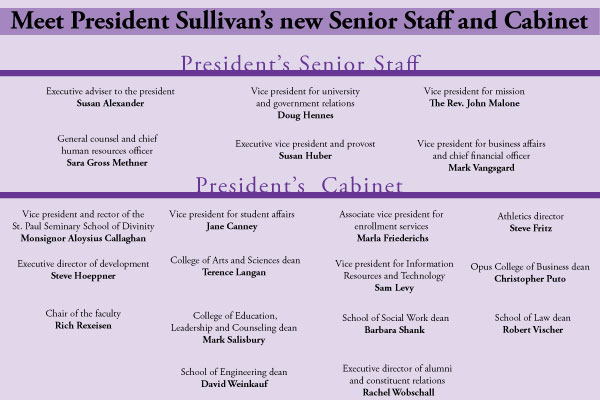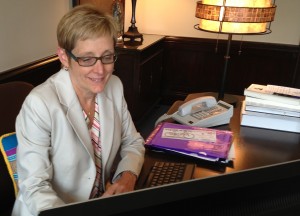
President Julie Sullivan made another step in implementing her vision for St. Thomas this week when she introduced the members of her advising staff.
The group is comprised of a six-member senior staff and a 14-member cabinet. The senior staff will meet with Sullivan once a week, and the cabinet will meet with her once per month. Sullivan said having this type of staff is a normal procedure for most universities.
“Most schools of our complexity and size would have some group like this,” Sullivan said. “It’s a very common thing.”
Despite this being the first official presidential cabinet in St. Thomas’ history, Sullivan said she was simply continuing a group that president emeritus the Rev. Dennis Dease already had in place.
“Father Dease had what he called the president’s senior staff and the president’s staff … he had a group that he met with weekly and a little bit bigger group that he met with monthly,” Sullivan said. “I also will have two groups.”
Sullivan cited her recent arrival to St. Thomas as a primary reason she was excited to meet with her senior staff and cabinet.

“It was an opportunity to appoint a large group of leaders, particularly for me as a new president, to give me regular feedback and discuss issues with. I feel like … a wealth of perspectives are coming to the table,” Sullivan said.
The senior staff is comprised of St. Thomas administrators who specialize in issues ranging from human resources to government relations, and mission to business affairs.
The cabinet is composed of a variety of executives who are involved in a variety of departments around campus, including Admissions, Athletics, Information Resources and Technology, the St. Paul Seminary School of Divinity, Alumni and Constituent Relations and Student Affairs. The deans of the various colleges at St. Thomas are also members of the cabinet.
Hierarchy within St. Thomas’ administration, Sullivan said, dictated the organization of advisers.
“A lot of it is organizational structure. The senior staff all report directly to me,” Sullivan said. “The cabinet has people that report directly to me, as well as some people who report to the provost, like the deans (and) the vice president of student affairs.”
Executive Adviser to the President Susan Alexander, a member of the senior staff, said she looks forward to meeting with the group and described it as an “opportunity.” Alexander also said she thinks this group is the best way for members of different departments to meet with one another.
“It’s the best place to have a discussion in a small group with the people who represent different areas and different things about the university but with the broad university context,” Alexander said.
Freshman Ellie Henkemeyer said she is excited to see what a new president will bring to the university.
“It’s really exciting. As a freshman, it’s cool that there’s a brand new president, too. I think she’s handling it really well,” Henkemeyer said. “(Sullivan) is getting on top of things and going to all the events.”
Sullivan maintaned that despite her advisers primarily being administrators, their main focus revolves around how they can help students.
“Certainly, our whole mission is about students, so our issues will always involve students,” Sullivan said.
Jacob Sevening can be reached at seve8586@stthomas.edu.


Rev. Reginald Whitt, professor of canon law at University of St. Thomas in Minneapolis – Director of Task Force, Archdiocese of St. Paul and Minneapolis
“Canon law is very eloquent on what a bishop is supposed to do, but there is no list of Thou Shalt Nots,” says Father Reginald Whitt (2002). “These (sex abusers) are criminals, but they are our criminals and we can’t lose them. Indeed, the bishops have a duty to try to save them,” says the Rev. Reginald Whitt, professor of canon law at University of St. Thomas in Minneapolis. (2002)
“……BISHOPS HAVE A DUTY TO TRY TO SAVE THEM (sex abuser priests)…..” Well, Fr. Whitt, where is it written (no, not in text or canon law…….it is written in one’s heart and soul) that the bishops have a duty to try to save the CHILDREN ABUSED and INNOCENT CHILDREN from the risk of abuse?
Seems like little has changed since these issues were studied over a decade ago by during the Dallas Charter Charade of the USCCB.
Father Whitt has a degree in canon law and civil law. Which perspective will take prominence and priority when he reviews the findings of the task force committee he established to review the debacle in the archdiocese? It is humanly, ethically and morally IMPOSSIBLE to avoid/resolve the conflicts of interest from both perspectives (civil and canon law) when attempting to review and support the rights of priests vs the rights of child victims.